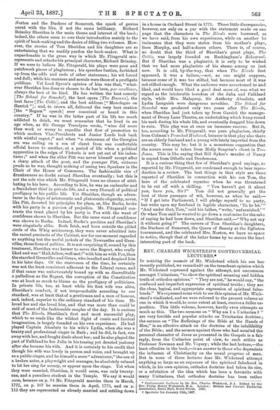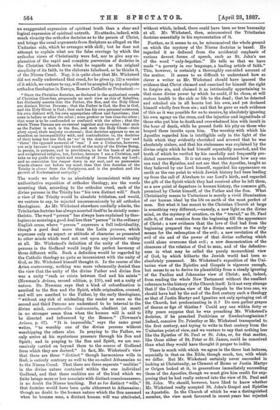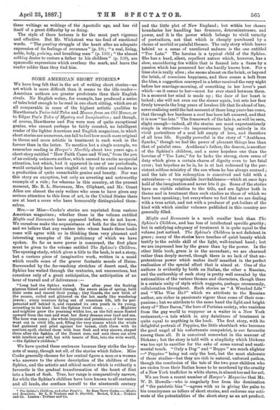BET. CHARLES WICKSTEED'S CONTROVERSIAL LECTURES.*
Is noticing the memoir of Mr. Wicksteed which his son has- recently published, we remarkedt on the trenchant opinion which Mr. Wicksteed expressed against the attempt, not uncommon amongst Unitarians," to show the spiritual meaning and hidden truth of orthodox opinions." "They are not," he would say, "the- confused and imperfect expression of spiritual truths ; they are the clear, logical, and appropriate expression of spiritual false- hoods." We expressed some wish to see this opinion of Mr. Wick.. steed's vindicated, and we were referred to the present volume as one in which it would, to some extent at least, receive a fuller ex- position. This little volume, however, hardly even attempts as much as this. The two sermons on " Why am I a Unitarian? " are very forcible and popular attacks on Trinitarian doctrine ; the sermon on "The Sufferings of the Bible at the Hands of Men," is an effective attack on the doctrine of the infallibility of the Bible; and the sermon against those who had assailed the personal character of Jesus as presented in the Gospels is a fair reply, from the Unitarian point of view, to such critics as Professor Newman and Mr. Voysey ; while the last lecture,—the least effective in the book,—is an answer to those who depreciate the influence of Christianity on the moral progress of man. But in none of these lectures does Mr. Wick-steal attempt anything so large as an exposure of the spiritual falsehood in which, in his own opinion, orthodox doctrine bad taken its rise, or a refutation of the idea which has been a favourite with many Unitarians, that orthodox doctrine has been rather • Controversial Lectures by the Res. Charles Wielatteed, RA. Edited by the Her. Philip Henry Wieksteed, M.A. London British and Foreign Yjnitarian Association, Essex Hall, Essex Street. 1887.
Spectator for January 15th, 1887.
an exaggerated expression of spiritual truth than a clear and logical expression of spiritual untruth. He attacks, indeed, with mach vivacity the orthodox doctrine as to the person of Christ, and brings the usual arguments from Scripture as alleged on the Unitarian side, which he arranges with skill ; but he does not
attempt to explain what are the false cravings by which the orthodox views of Christianity were fed, nor to give any ex- planation of the rapid and complete perversion of doctrine in
the Christian Church from what he regards as the original simplicity of its faith, to the elaborate falsehood, as he thinks it, of the Nicene Creed. Nay, it is quite clear that Mr. Wicksteed did not really understand that creed, for he gives (p.12) a version of it which, we venture to say, will not be accepted by any adequate orthodox theologian in Europe, Roman Catholic or Protestant :—
" Since the Christian doctrine, as declared in the authorised creeds of Christian Churches, propounds no such view as this of Sabellins, but distinctly asserts that the Father, the Son, and the Holy Ghost are distinct Divine Persona ; that the Father is God, the Son is God, and the Holy Ghost is God ; that each has his own personal existence, his own distinct will, his own appropriate offices and functions; that none is before or after the other ; none grehter or less than the other ; that none is to be confounded or confused with the other ; that the whole Three Persons are co-eternal together and co-equal ; that such as the Father is such is the Son, and such the Holy Ghost—their glory equal, their majesty co.eternal ; that doctrine appears to me as manifest an incompatibility with, and contradiction to, the doctrine of their being but one God, as 'so' is the destruction of 'yea' and 'three' the opposed numeral of 'one.' I am a Unitarian, however, not only because I regard thia truth of the unity of the Divine Being, in person, in purpose, and in providence, to be the basis of all pure and enlightened religion, but, further, because I am a Christian, and take as my guide the spirit and teaching of Jesus Christ, my Lord ; and no conviction lies deeper down in my soul, and no persuasion stands clearer out before my mind, than that this doctrine of the Trinity is absent from the Scriptures, and is the product and the growth of Ecclesiastical antiquity."
The words we refer to as absolutely inconsistent with any authoritative exposition of orthodox theology, are the words asserting that, according to the orthodox creed, each of the divine persons in the Trinity has "his own distinct will." Such a view of the Trinity would be absolute tritheism, and would, we venture to say, be rejected unceremoniously by all orthodox theologians. As Mr. Wicksteed elsewhere cordially admits, the Trinitarian doctrine has always asserted itself to be strictly mono- theistic. The word "person" has always been explained by theo- logians as meaning a good deal less than "person" in the ordinary English sense, where " person " expresses a full individuality, though a good deal more than the Latin persona, which expresses only an aspect or attitude of character as presented to other minds which need not rest upon any inherent reality at all. Mr. Wicksteed's definition of the unity of the three persons in the Godhead would imply the perfect harmony of three different wills. Such a definition would be regarded by the Catholic theology as quite as inconsistent with the unity of God, as Mr. Wicksteed himself thought it. In the course of the Arian controversy, nothing was more vehemently denied than the view that the unity of the divine Father and divine Son was a unity "such as exists between God and his saints" (Newman's .Arians, second edition, p. 130), and not a unity of nature. Dr. Newman says that a kind of subordination is ascribed to the Son and the Spirit, while origination, counsel, and will are ascribed to the Father, by the early theologians, " without any risk of misleading the reader as soon as the second and third Persons are understood to be internal to the divine mind, connaturalia instrumenfa, obedient (at most) in no stronger sense than when the human will is said to be directed and influenced by the Reason." (Newman's Arians, p. 97). "It is impossible," says the same great writer, "to worship one of the divine persons without worshipping the others also. In praying to the Father, we only arrive at his mysterious presence through his Son and Spirit; and in praying to the Son and Spirit, we are suc- cessively carried on beyond them to the source of Godhead from which they are derived." In fact, Mr. Wicksteed's view that there are three " distinct " though harmonious wills in God, is entirely contrary as well to the so-called Athanasian as to the Nicene Creed. That there are three separate "realities" in the divine nature contained within the one individual Godhead, and that these realities are of the kind which we finite beings more or less associate with distinct conscionenesses, is no doubt the Nicene teaching. But as for distinct "wills," that doctrine would have been quite abhorrent to Athanasius though no doubt to the human nature which the Son assumed when he became man, a distinct human will was attributed,
without which, indeed, there could have been no true humanity at all. Mr. Wicksteed, then, misconceived the Trinitarian doctrine essentially in his representation of it.
Further, as it seems to us, he misconceived the whole ground on which the mystery of the Nicene doctrine is based. He regarded it as deduced from the accidental emphasis of various devout forms of speech, such as St. John's use of the word "only-begotten." He tells us that we have made "a poverty in our language, a leading article of faith." This, however, is certainly a thoroughly one-sided account of the matter. It seems to us difficult to understand how so clever a writer as Mr. Wicksteed should have ignored the evidence that Christ claimed and exercised for himself the right to forgive sin, and claimed it as intrinsically appertaining to that same divine power by which he could, if he chose, at will restore health to the sick or life to the dead ; that he detected and rebuked sin in all hearts but his own, and yet declared himself wholly free from sin ; and that he gave us such evidence of this as it was possible for ns to receive, by absolutely ignoring his own agony on the cross, and the injustice and ingratitude of those who put him to death and overwhelmed him with insult in the hour of death, while he poured forth his pity on those who heaped these insults upon him. The worship with which his Apostles regarded him is intelligible only in the light of the faith which they evidently cherished and avowed that he was absolutely sinless, and that his sinlessness was explained by the divine origin which he had himself repeatedly asserted, and the truth of which he verified by his carefully and frequently pre- dicted resurrection. It is not easy to understand how any one can read the Epistles, and not see that the Apostles, taught as they believed by our Lord himself, regarded his appearance on earth as the one point to which Jewish history had been leading up from the call of Abraham to our Lord's birth, and regarded the gift of the Spirit which they had received after he left them, as a new point of departure in human history, the common gift, promised by Christ himself, of the Father and the Son. What Christianity means to Unitarians is merely a vivid illumination of our human ideal by the life on earth of the most perfect of men. But what it has meant to the Christian Church at large is something very different, —namely, a new light on the divine mind, on the mystery of creation, on the "travail," as St. Paul calls it, of that creation from the beginning till the appearance of Christ; a new evidence that the love of God had from the beginning prepared the way for a divine sacrifice as the only means for the redemption of the evil; a new revelation of the evil of sin and of the power of that divine suffering which could alone overcome that evil ; a new demonstration of the closeness of the relation of God to man, and of the defective- ness in what may be called the purely monarchical view of God, by which hitherto the Jewish world had been so absolutely possessed. Mr. Wicksteed's exposition of the Uni- tarian view of the Epistles and Gospels is vigorous enough, but seems to us to derive its plausibility from a steady ignoring of the Pauline and Johannine view of Christ; and, indeed, from reading the whole New Testament without the smallest reference to the history of the Church itself. Is it not very strange that if the Unitarian view of the Gospels he the true one, we should have bad by the end of the first century such a theology as that of Justin Martyr and Ignatius not only springing out of the Church, but predominating in it ? Do men gather grapes of thorns or figs of thistles ? Could any one within forty or fifty years suppose that he was preaching Mr. Wicksteed's doctrine, if he preached Positivism or Swedenborgianism P Indeed, conceive Dr. Priestley or Mr. Wicksteed transported to the first century, and trying to write in that century from the Unitarian point of view, and we venture to say that nothing less like the Epistles of St. Paul or St. John, or, for that matter, like those either of St. Peter or St. James, could be conceived than what they would have thought it proper to indite.
There is much with which we agree in the three last lectures, especially in that on the Bible, though much, too, with which we differ. But Mr. Wicksteed certainly never succeeded in looking at Christianity, as Clement of Rome or Justin Martyr or Origen looked at it, in generations immediately succeeding those of the Apostles, though we must give him credit for sup- posing that he had really entered into the view of St. Paul and St. John. We should, however, have liked to know whether Mr. Wicksteed really accepted St. John's Gospel and Epistles as Apostolic. In the Church of which he was a distinguished member, the view most favoured in recent years has rejected. these writings as writings of the Apostolic age, and has rid itself of a great difficulty by so doing.
The style of these lectures is for the most part vigorous and effective. But Mr. Wicksteed was too fond of emotional words. "The panting struggle of the heart after an adequate expression of its feelings of reverence" (p. 19) ; "a real, living, noble, holy, pulsing, and breathing man" (p. 150) ; "the almost sobbing desire to restore a father to his children" (p. 159), are spasmodic expressions which overleap the mark, and leave the reader colder than they find him.




































 Previous page
Previous page